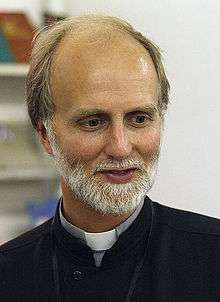Borys Gudziak
| The Right Reverend Borys Gudziak | |
|---|---|
| Ukrainian Eparchial Bishop in France, Benelux and Switzerland | |
 | |
| Church | Ukrainian Greek Catholic Church |
| Installed | 2 December 2012 |
| Predecessor | Michel Hrynchyshyn |
| Successor | Incumbent |
| Other posts |
President of the Ukrainian Catholic University (since 2000) Titular Bishop of Carcabia (2012–2013) |
| Orders | |
| Ordination |
26 November 1998 (Priest) by Sofron Stefan Mudry |
| Consecration |
26 August 2012 (Bishop) by Sviatoslav Shevchuk |
| Personal details | |
| Birth name | Borys Andrij Gudziak |
| Born |
24 November 1960 Syracuse, New York, United States |
| Nationality | American |
Borys Gudziak (born 24 November 1960) became the Eparch of the Ukrainian Greek Catholic Eparchy of Paris on the elevation of his Exarchate to a full Eparchy, or Eastern-rite Diocese, by the Pope on January 19, 2013. He served as the head of the territory since his installation as Exarch on December 2, 2012.
Gudziak was born in Syracuse, New York USA. His parents, both Ukrainian Greek Catholics had come to New York from western Ukraine in the early 1950s . After completing his pre-university studies at Christian Brothers Academy, he graduated from Syracuse University, obtaining a dual degree in philosophy and biology in 1980. He entered the College of Saint Sophia in Rome where, as a student of the Lviv Archeparchy under Cardinal Josyf Slipyj, he attended the Pontifical Urban University. In 1983 he graduated in theology and began doctoral studies in an interdepartmental program of Slavic and Byzantine Cultural History at Harvard University, where he received his Ph.D. in 1992.[1] His thesis, Crisis and Reform: The Kievan Metropolitanate, the Patriarchate of Constantinople, and the Genesis of the Union of Brest, was published by the Harvard Ukrainian Research Institute in 1998.[2]
From October 1994 until July 1995 he attended the Pontifical Oriental Institute, examining in particular the synthesis of neopatristic Orthodox theologian Georges Florovsky.
In 1992, he moved permanently to Lviv where he founded the Institute of Church History (ISC), becoming its Director until October 2002. In 1993 he was appointed Chairman of the Commission for the Renewal of the Lviv Theological Academy by Archbishop Myroslav Ivan Lubachivsky. From 1995 until 2000 he served as Vice Rector of the Lviv Theological Academy, then as Rector from 2000 to 2002. In that year, Gudziak became Rector of the Ukrainian Catholic University (founded on the basis of the Academy), and later its President.
He was ordained on 26 November 1998 in the Cathedral of St. George in Lviv by Bishop Sofron (Mudry), O.S.B.M. and incardinated in the Major Archeparchy of Lviv of the Ukrainians. He is the author of over 50 studies on the history of the Church, theological training and on different topics of cultural relevance.
On 21 July 2012 it was announced that Pope Benedict XVI accepted the resignation of Michel Hrynchyshyn from the pastoral Apostolic Exarchate for Ukrainians of the Byzantine rite in France,[3] and appointed Borys Gudziak Apostolic Exarch for the Ukrainian faithful of the Byzantine rite in France, at the same time appointing him Titular Bishop of Carcabia. He was ordained a bishop on 26 August 2012 and installed in a Divine Liturgy on 2 December 2012.
On Saturday, January 19, 2013, Benedict XVI elevated the Apostolic Exarchate of France, Benelux and Switzerland for the Ukrainians to the status of a full Apostolic Eparchy (the equivalent of a Diocese), and named it after Saint Vladimir. Gudziak, though already an ordained Bishop, is now an Eparch (the ordinary, or head, of a fully established Eastern diocese), instead of Exarch. He ceased to be a Titular Bishop since he is now a full Eparch.[4]
Gudziak is the 49th member of the Synod of Bishops of the Ukrainian Greek Catholic Church. Besides France, the Eparchy also includes Belgium, the Netherlands, Luxemburg, and Switzerland.[5]
Awards
- Antonovych prize (2006)
References
- ↑ "Archived copy". Archived from the original on 2012-04-20. Retrieved 2012-08-09.
- ↑ Gudziak, B.A. (1992). Crisis and Reform: The Kievan Metropolitanate, the Patriarchate of Constantinople, and the Genesis of the Union of Brest. Harvard University. Retrieved 2015-03-22.
- ↑ "RINUNCE E NOMINE". news.va. Retrieved 2015-03-22.
- ↑ "press.catholica.va/news_services/bulletin/news/30325.php?index=30325&lang=en - Translator". microsofttranslator.com. Retrieved 2015-03-22.
- ↑ "Rector of the Ukrainian Catholic University nominated Apostolic exarch for Ukrainians in France | Ukrainian Catholic University". ucu.edu.ua. Retrieved 2015-03-22.
| Preceded by Michel Hrynchyshyn, C.S.S.R. |
Apostolic Exarchate in France, Benelux and Switzerland for the Ukrainians 21 July 2012–present |
Incumbent |